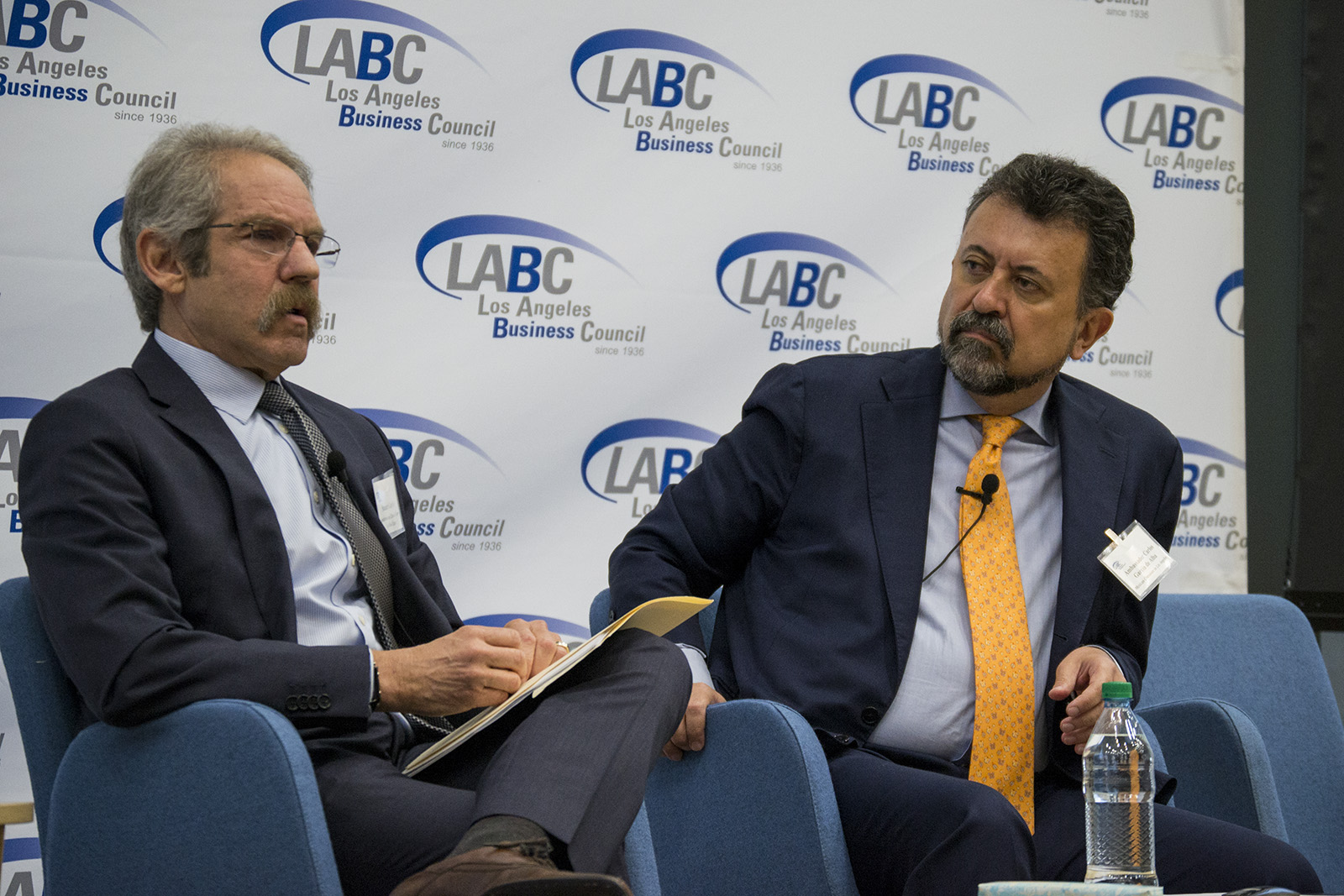UCLA hosts economic forum to discuss Mexico-LA trade relation

Stuart Gabriel (left), chair of Arden Realty, Inc. and professor of finance at the UCLA Anderson School of Management, and Carlos García de Alba (Right), consul general of Mexico in Los Angeles, discussed the economic relationship between Los Angeles and Mexico. (Angelina Ruiz/Daily Bruin)
By Ryan Leou
May 7, 2017 11:32 p.m.
Los Angeles and Mexican business and political leaders discussed trade and collaboration between the two jurisdictions at a Friday forum held at UCLA.
The Los Angeles Business Council organized the inaugural LABC Mexico and Los Angeles Economic Forum to discuss how recent political events could impact the business opportunities stemming from Los Angeles and Mexico’s long-standing economic ties. Several U.S. officials, including Los Angeles Mayor Eric Garcetti, addressed the crowd of about 100 people.
Stuart Gabriel, director of the Ziman Center for Real Estate at UCLA, and Carlos García de Alba, consul general of Mexico in Los Angeles, discussed the amount of trade between Los Angeles and Mexico.
García de Alba, formerly Mexico’s ambassador to Ireland, said he has tried to balance providing legal services for Mexican citizens and promoting Mexico’s commercial interests in his 10 months stationed in Los Angeles.
He added he thinks the consulate should reach out to the other 200 minorities in Los Angeles, not just Mexicans.
Gabriel said trade with the U.S. is important for Mexico. Bilateral trade between Mexico and California totals to about $26 billion in goods annually, he added.
“Exports means income increases and higher employment,” Gabriel said. “700,000 jobs are located exclusively with trade in Mexico.”
He added though the exchange rate between the peso and the dollar has increased in recent years, the election of President Donald Trump did not have as much of an effect as some people have speculated.
“(The falling value of the peso) has been ongoing for past three or four years due to events in Mexico and the U.S.,” Gabriel said. “Mexico is a petroleum-exporting economy, and prices have fallen, putting downward pressure on the peso.”
He also said the early emergence of the U.S. from the great recession, tightening of monetary policy, relatively higher interest rates and a stronger investment environment has made U.S. exports more expensive abroad. This has meant Mexico has greater access to U.S. markets.
Gabriel added that about $400 billion in goods passes through the Los Angeles Customs District, the largest in the United States, on an annual basis, which he thinks underscores the importance of trade between Los Angeles and Mexico.
García de Alba touted Mexico’s $35 billion investment in the United States, and said 30 percent of Los Angeles’ tourists come from Mexico.
“We are a region,” he added. “If we want to be competitive, we need to integrate more and better.”
Gabriel said economic integration effforts, such as the North American Free Trade Agreement, bring higher levels of prosperity to all populations involved and is vital to the economies of both countries in the future.
“Bringing Mexico into NAFTA helped to create the middle class in Mexico (and) higher levels of human capital,” he added. “Integration, we see, is not just a function of goods and services flowing back and forth, but a function of people as well. There’s a critical mass of Mexican business in Los Angeles and American business in Mexico.”
Garcetti told the audience that despite the federal government’s attitude toward Mexico, he would continue to travel south and seek partnerships in industries like aerospace or clean technology.
“Our Southern neighbors are being demonized by political leaders,” Garcetti added. “You cannot say you don’t believe in things, that you don’t believe in relationships. That language is much more destructive; it plants seeds that take much longer to unwind than it takes to say and do those things.”
He also said if the U.S. pulls out of the Paris Agreement on climate change, he would work to adopt its policies in Los Angeles. He added he hopes the city serves as a model for cities in Mexico in areas such as public transportation and clean energy.
Other panels during the event addressed real estate in Mexico, the future of NAFTA and the renewable energy market in Mexico.


